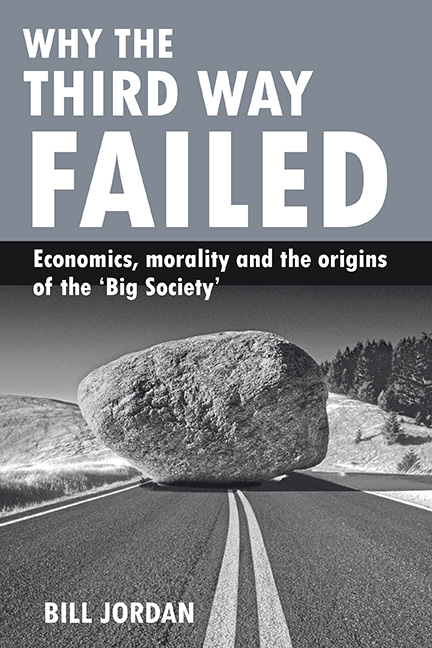two - Snap judgements and rational choices
Published online by Cambridge University Press: 01 September 2022
Summary
While I have argued that the failure of the Third Way was ultimately a consequence of its moral shortcomings, it came into being as a moral project, to reconcile individual freedom with collective solidarity and security. It was conceived as a political philosophy to improve social justice and to achieve an acceptable equality (of opportunity, not outcome) in market economies.
No proponent of Third Way ideas was more up-front about his ethical credentials than former Prime Minister Tony Blair. He proclaimed that Labour's values had not changed under his leadership, but that the means of achieving them should change. The Third Way was a project for finding new expression for the values of socialism, feminism, antiracism and social justice. It ‘is a serious reappraisal of social democracy, reaching deep into the values of the left to develop radically new approaches’ (Blair, 1998a, p 1).
These ideas were forged together into a programme for ‘national renewal’ of the UK, aimed at ‘rediscovering our true national purpose’ (Blair, 1998b, p iii). The principles embodied in this were listed as ‘equal value [of each individual citizen], opportunity for all, responsibility and community’ (Blair, 1998a, p 3), and were expressed in ‘a new contract between the citizen and the state, where we keep a welfare state from which we all benefit, but on terms that are fair and clear’ (Blair, 1998b, p v).
In this chapter I show that the attempt to define a new settlement of this sort was a conscious effort to transcend Margaret Thatcher’s ‘property-owning democracy’, by combining individualism with egalitarianism in a new way. As suggested by Perri 6 (2000), this involved the reconciliation of two apparently conflicting ‘cultural projects’, one concerned with personal self-realisation and rights to autonomy, the other with membership and community. The attempt to do this through abstract general principles, combined with detailed codification, legislation, regulation, prescription, reward and punishment, marked out the Third Way as a utilitarian project, in the tradition of Jeremy Bentham.
Within this tradition of political economy, choice is central for individual liberty and rationality. Each citizen is morally sovereign, and is protected against arbitrary and invasive authority by freedom of choice, across a broad range of private and collective issues. Human beings are conceived as utility maximisers, implementing preferences across a number of goods, including facilities they share with others.
- Type
- Chapter
- Information
- Why the Third Way FailedEconomics, Morality and the Origins of the 'Big Society', pp. 43 - 62Publisher: Bristol University PressPrint publication year: 2010



